Eating Hormone Balancing Foods is a powerful way to feel your best, both physically and mentally. As a dietitian, I get asked about hormone balancing foods quite a bit. In this post, I share the top foods I recommend for healthy hormones.

Jump to:
- The Role of Hormones
- 1. Healthy Fats
- 2. High Quality Protein Foods
- 3. Cruciferous Veggies
- 4. Think Mediterranean for Hormone-Balancing Foods
- 5. Complex Carbohydrates High in Dietary Fiber
- 6. Eat Your Colors!
- 7. High Magnesium Foods
- 8. Add Plenty of Herbs and Spices
- 9. Gut Healthy Foods
- Foods to Avoid for Hormone-Balance
- Other Hormone Balancing Tips
- In conclusion
- LOOKING FOR MORE NUTRITION EDUCATION?
- CHECK OUT THESE NOURISHING Dietitian RECIPES
- 💬 Comments
The endocrine system regulates hormone production and is made up of endocrine glands and organs. Hormones are chemical messengers that travel through the bloodstream and regulate many functions in the body. Hormone balance is important when it comes to optimizing health, and a healthy diet rich in nutrients can have a big impact on hormone levels.
The Role of Hormones
Here are just some of the functions hormones play:
- Adrenal glands produce the stress hormone, cortisol. Cortisol levels fluctuate throughout the day and are typically highest in the morning. According to the Mayo Clinic, if cortisol levels are chronically high it can put you at risk of many health problems including weight gain, heart disease, high blood pressure, a disrupted sleep cycle, and mental health illnesses including depression and anxiety. Regulating your nervous system is important to bring down high levels of this stress hormone. Eating a hormone-balancing diet can help, too!
- Thyroid hormones regulate metabolism, heart rate, and growth. It also plays a role in bone development, body temperature regulation, and brain health. When thyroid hormones are either too high or too low, it can impact metabolism and cause fatigue, hair loss, unintended weight loss, weight gain, and depression.
- The pancreas is an organ that releases insulin and glucagon. Both of these hormones play an important role in blood sugar control and regulation. If someone has insulin resistance, their cells can't readily absorb the glucose needed for energy and this leads to high blood sugar levels in the blood. Eating hormone-balancing foods can improve insulin sensitivity.
- Your appetite is also regulated by fullness and hunger hormones. Ghrelin is often called the "hunger hormone" because it signals to your brain when it's time to eat. Leptin is the hormone that signals to your brain that it's time to stop eating. Keeping these hormones balanced is important to maintain a healthy weight long term.
- Sex hormones produced in the ovaries in females and testes in males are also important for hormone health. The ovaries secrete the female hormones estrogen and progesterone which are important for reproduction and menstruation. They also produce androgens including a small amount of testosterone. When there are hormone imbalances in the female reproductive system caused by high levels of androgen production, it can lead to polycystic ovary syndrome (PCOS), a common cause of infertility in women. Symptoms of PCOS include an irregular menstrual cycle, acne, abnormal hair growth, and unpredictable ovulation. In men, the testes produce testosterone. High testosterone levels in males can cause acne, mood swings, abnormal hair growth, and infertility.

Hormone imbalance can leave you feeling fatigued, anxious, or with mood swings, insatiable cravings, and weight gain that you can’t explain.
If you have chronically high stress, feel exhausted, experience low energy throughout the day, or have unexplainable weight gain or cravings, chances are hormones are involved and hormone-balancing foods can help.
The good news is there are some natural ways you can improve your hormonal health. Adding plenty of whole foods to your daily diet is a great way to support your hormones. Optimal health and feeling your best are accessible with small changes over time.
So without further ado, here are 9 hormone-balancing foods to add to your plate today!

1. Healthy Fats
Healthy or "good" fats include unsaturated fats. Omega-3 fatty acids and oleic acid play a role in the production of some hormones and can also help with hormone regulation. Another reason they are a hormone-balancing foods is they are anti-inflammatory nutrients that can ease inflammation in your body and make it easier for it to produce the hormones it needs to function effectively. Omega-3s have also been shown to be heart-healthy and support brain health.
Examples of Foods High in Omega-3 Fatty Acids and Other Healthy Fats
- Fatty fish including salmon - salmon is a great source of Omega-3s including eicosapentaenoic acid (EPA) and docosahexaenoic acid (DHA) which have anti-inflammatory properties. Other fatty, oily fish include herring, mackerel, trout, anchovies, tuna, and sardines.
- Olive Oil - Olive oil is high in an Omega-9 fatty acid called Oleic Acid that is anti-inflammatory and may reduce the risk of heart disease, too. Olive oil is great to use in dressings and marinades. It's also a key ingredient in many Mediterranean dishes such as hummus.
- Avocado Oil - Avocado oil is also high in the same anti-inflammatory Oleic Acid as Olive Oil and also contains Vitamin E. It has a milder flavor than olive oil so I love using it in baked goods and salad dressings that I want It also has a high smoke point making it a great hormone-balancing food for high-heat cooking such as sauteing, baking, or roasting.
- Flaxseed Oil - flaxseed oil is high in Omega-3s and can be used in dressings and dips or added to smoothies. It's not a good cooking oil since it has a very low smoke point.
- Nuts and Nut Butters - snack on walnuts, almonds, hazelnuts, pistachios, pecans, cashews, macadamia nuts, or their butter. Brazil nuts are another hormone-balancing foods that is high in Omega-3s and selenium, another nutrient that can support the immune system and thyroid.
- Seeds - flax seeds, chia seeds, hemp seeds, or pumpkin seeds are all great options.

2. High Quality Protein Foods
High quality protein are hormone-balancing foods that can help with balancing blood sugar levels and muscle mass. Protein is also important because essential amino acids are the building blocks of many hormones called peptide hormones. Peptide hormones are vital for stress responses, energy levels, and appetite control.
You may not need as much protein as you think, though. Aim for 25-30 grams of protein per meal as a general rule.
For hormone balance, aim for a combination of plant protein and high-quality animal protein unless you are a vegetarian.
Examples of Foods High in Protein
- Eggs - A breakfast that includes eggs has been shown to help balance blood sugar and keep you full for longer than a breakfast high in carbohydrates like cereal or toast by itself.
- Poultry - Chicken breast, or lean turkey are great options.
- Red Meat - Red meat is high in iron which is important for menstruating women
- Fish and Seafood - Fish like tilapia, cod, rainbow trout, and the fatty fish mentioned above and seafood such as scallops, shrimp or crab are also great sources of protein.
- Dairy Products - Greek yogurt, Skyr (Icelandic yogurt), milk and cottage cheese. Soy milk is also high in protein compared to other plant milk. Dairy products also contain calcium and vitamin D to support bone health.
- Legumes - Legumes include beans and lentils. Peanuts are also legumes. Examples include chickpeas, soybeans, kidney beans, broad beans, green peas, black beans, cannellini beans, and lentils.
- Nuts and Seeds - pumpkin seeds (pepitas), flax seeds, chia seeds, sesame seeds and sunflower seeds all contain protein. Use nuts like almonds, walnuts, cashews, pecans, pistachios, and pine nuts in recipes, on top of salad or soup, or snack on them alone.
- Other plant-based protein sources include nutritional yeast, tempeh, tofu, and quinoa.

3. Cruciferous Veggies
Cruciferous vegetables can help to remove excess estrogen from the body and are at the top of the list of hormone-balancing foods. They are also high in fiber and antioxidants which have a beneficial effect on your overall health and play a role in decreasing oxidative stress in the human body.
Examples of Cruciferous Vegetables
- Broccoli
- Cauliflower
- Brussels Sprouts
- Cabbage
- Collard Greens
- Mustard Greens
- Arugula
- Bok Choy
- Kale
- Radish
- Rutabaga

4. Think Mediterranean for Hormone-Balancing Foods
In general, the Western diet is high in sugar and high-fat animal foods which can lead to high estrogen levels. Research has shown that following a diet that is similar to the Mediterranean diet can improve estrogen levels and reduce the risk of breast cancer.
The Mediterranean diet is loaded with hormone-balancing foods including healthy fats, plant foods like nuts, legumes, vegetables and fruits, and herbs and spices that are loaded with antioxidants.

5. Complex Carbohydrates High in Dietary Fiber
High fiber foods help with insulin levels and blood sugar control. By eating foods high in soluble and insoluble fiber instead of simple carbs like those found in white breads, pastas, cereals, and baked goods, you can support your gut health which also impacts hormonal balance and immunity.
Lastly, complex carbs are hormone-balancing foods because they can help you stay full for longer and help with weight loss.
Examples of Foods High in Complex Carbohydrates:
- Fruits - berries, apples, pears, peaches, oranges, grapefruit, bananas, avocado, papaya, pomegranate, and mango contain fiber. Eat fruit with the skin on when appropriate. An apple with the skin on provides more fiber than one without. Many of these fruits are high in vitamins and other nutrients such as potassium and vitamin C which is good for immunity.
- Vegetables - many vegetables such as leafy greens, sweet potatoes, regular potatoes, cruciferous vegetables, squash, eggplant, and carrots contain dietary fiber.
- Whole grains - these include brown rice, black rice, red rice, wild rice, barley, buckwheat, quinoa, sorghum, corn, and rye. Whole grains often also contain vitamin B and thiamine. Whole wheat bread and oats are also sources of fiber and oats can help lower cholesterol levels.
- Legumes - beans and lentils are hormone-balancing foods not only great sources of protein- they are also high in dietary fiber.
Aim for a fiber intake of 25-30 grams of fiber per day to meet your recommended intake.

6. Eat Your Colors!
It sounds basic, but sometimes the basics are there for a reason and they are easy to forget. Don’t forget to add color to your plate with fruits and vegetables, beans, and different herbs. Colorful foods that are natural colors are almost always hormone-balancing foods.
The best way to ensure you are eating enough nutritious foods that contain vitamins, minerals, and nutrients to keep your hormones in balance and support your body, add color to your plate at every meal.
If you don't like fruits and vegetables roasted, make a smoothie out of frozen blueberries, strawberries, spinach, and milk.

7. High Magnesium Foods
Foods high in magnesium are on the list of hormone-balancing foods because magnesium is important for the health of your thyroid which secretes hormones important for metabolism.
Examples of Foods High in Magnesium
- Spinach
- Avocado
- Tofu
- Peanuts
- Almonds
- Pumpkin Seeds
- Black Beans
- Edamame

8. Add Plenty of Herbs and Spices
Fresh herbs and spices that are sources of antioxidants can help with hormone health and also add flavor to other hormone-balancing foods!
Examples of Herbs and Spices
- Fresh or Dried Herbs - these include parsley, basil, mint, cilantro, thyme, oregano, rosemary and dill.
- Spices - some spices that are high in antioxidants include cloves, allspice, turmeric, cumin, cinnamon, paprika and garlic powder.

9. Gut Healthy Foods
A healthy digestive system is important for many aspects of overall health including hormones, brain health, and immunity. Good digestion leads to the absorption of the nutrients needed for hormone balance.
If you struggle with constipation, bloating, or diarrhea, try adding these gut-healthy foods to improve your hormone health.
Examples of Gut Healthy Foods
- Foods high in probiotics - foods high in probiotics include fermented foods like yogurt, kefir, sauerkraut, kimchi, kombucha, miso, tempeh, and cottage cheese. Look for live, active cultures when grocery shopping for these.
- Prebiotic foods - asparagus, bananas, garlic, onions, leeks, cabbage, oats, beans, chicory root, and Jerusalem artichokes are all prebiotics foods.
- Foods high in polyphenols - this includes berries, plums, cherries, flax seeds, black olives, tea and coffee and dark chocolate.
- Water - be sure to stay hydrated to support your gut health and hormone health, too.
Learn more about Top Foods for a Healthy Gut.

Foods to Avoid for Hormone-Balance
In addition to adding the best foods for hormones, it's important to avoid foods that negatively impact them. Try to cut back on ultra-processed foods, foods high in saturated fats, energy drinks, foods high in refined sugars and alcohol.
Other Hormone Balancing Tips
In addition to eating hormone-balancing foods, there are other important lifestyle changes you might consider if you want to balance hormones and feel your best.
Eat Slowly
Be mindful while you eat and be sure to chew your food and take a little bit of time to eat your meal. Then, rest and digest after you finish eating. Give yourself 10-15 minutes after a meal to “rest”.
In other words, do some reading, watch a show, do a meditation, or journal. Or just chat with the person you are sharing a meal with if that’s available to you. This helps your body to digest your food and slowing down when eating has a positive impact on your gut health. Gut health is closely tied to hormone health, so it’s a win-win!
Incorporate Movement Throughout Your Day.
Try to get some movement throughout your day whether that’s a walk, yoga, or a pilates-style strength class. Gentle movement can help to regulate your hormones. Whatever type of exercise you enjoy the most is the one you will stick with. Try to avoid too much high-intensity exercise as it can lead to chronically high-stress levels in the body.
Stress Management
Part of healthy hormones is managing stress levels. When stress is high, hormones like cortisol increase and can lead to an increased appetite, weight gain, and other health issues. Pick up a new stress management technique.
Try spending time with loved ones, calling an old friend, meditation, journaling, or starting the day with a gratitude prayer. Talking a walk outside or listening to a good playlist are also ways to bring down stress levels.
Get Enough Sleep
Getting as close as you can to 8 hours of sleep gives your body the time it needs to rest and reset.
Talk to a Doctor
This article is not meant to be medical advice. While a diet high in hormone-balancing foods can play a powerful role in hormone health, always talk with your healthcare provider if you are experiencing symptoms of hormone imbalance. Together, you can create a plan that may include medication and supplementation in addition to nutrition and lifestyle changes.

In conclusion
Hormone health is very important in overall health and feeling your best. Hormones control nearly everything in your body, from reproductive health to hunger and fullness cues and energy levels.
If you want to keep your hormones in balance, a focus on eating nutritious foods like the ones on this list of hormone-balancing foods can help!
I hope you enjoyed this article and learned something new! If so, I would love to connect. Please leave me a comment below or find me on Instagram....I LOVE knowing there’s people out there reading my articles. 🙂 IG: @mallorythedietitian
Resources: Obgyn Associates of Alabama, Woman's International Pharmacy, Frontiers in Endocrinology, Mayo Clinic, Hum Nutrition, Nutrition4Change
LOOKING FOR MORE NUTRITION EDUCATION?
Here are some of my educational posts you may enjoy:



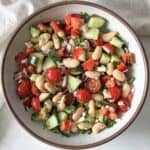
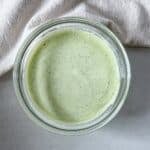





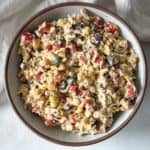


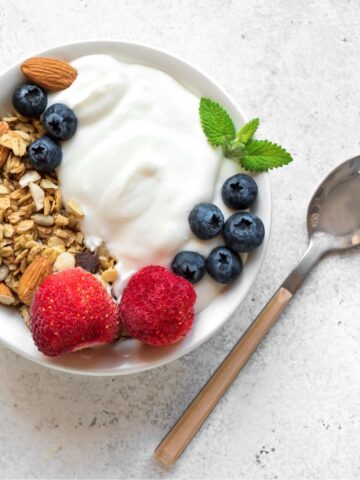
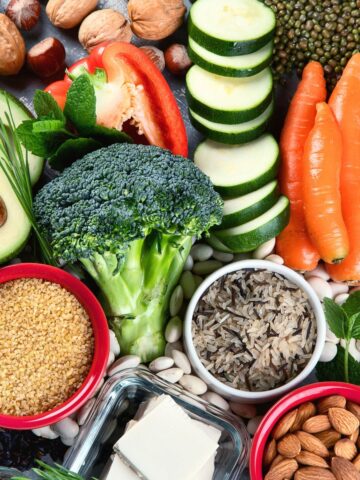

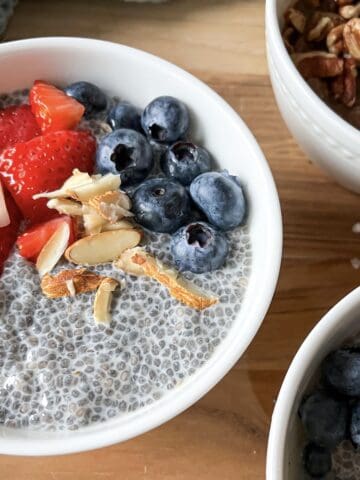
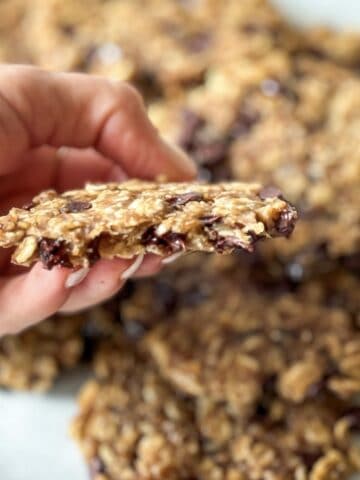

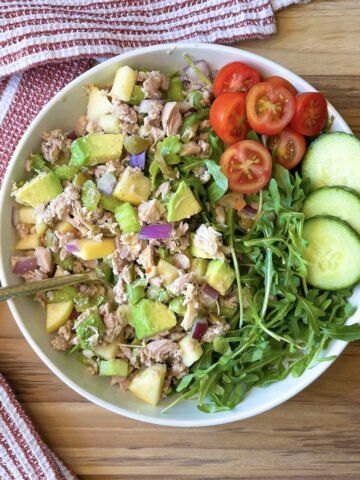




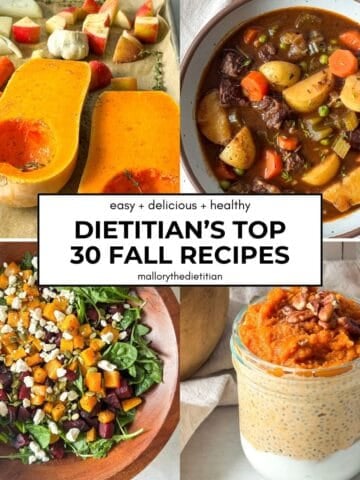
Comments
No Comments